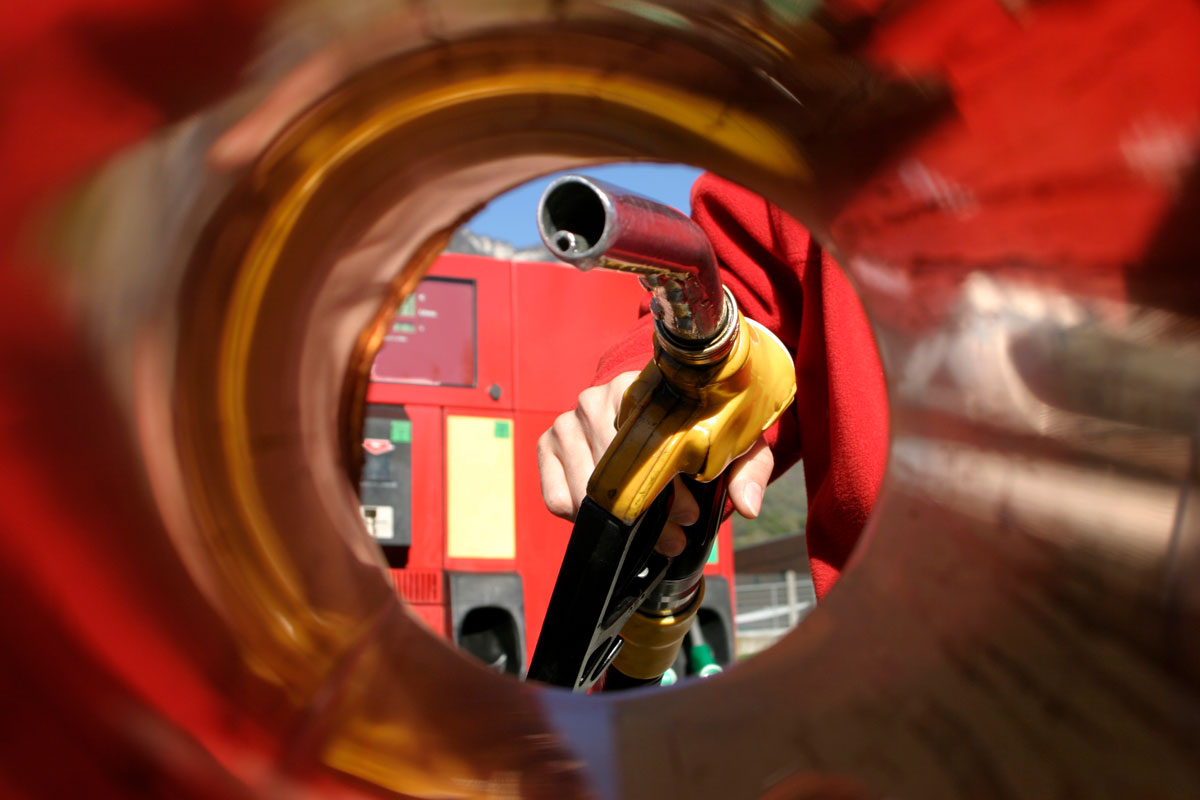A mixed bag
The Indian economy is currently at a critical juncture. The Centre’s recent monthly economic report paints a picture that’s both…
State-owned fuel retailing companies, Indian Oil Corp (IOC), Bharat Petroleum Corp Ltd (BPCL) and Hindustan Petroleum Corp Ltd (HPCL) had frozen petrol and diesel prices since March 16.

It cut excise duty by Rs 2 in October 2017 and by Rs 1.50 a year later. But it raised excise duty by Rs 2 per litre in July 2019. (Photo: iStock)
The cash-strapped government will gain close to Rs 1.6 lakh crore in additional revenues this fiscal from a record increase in excise duty on petrol and diesel, that will help make up for revenue it lost in a slowing economy and shutting down of businesses due to coronavirus lockdown.
Late on Tuesday evening, the government hiked excise duty on petrol by Rs 10 per litre and that on diesel by Rs 13 a litre to mop up gains arising from international oil prices falling to a two-decade low.
Advertisement
This is the second hike in excise duty in less than two months and will help government garner over Rs 1.7 lakh crore in additional revenues annually at 2019-20 level of consumption, industry officials said.
Advertisement
Considering the slump in consumption due to travel restrictions imposed by coronavirus lockdown, the gains in the remaining 11 months of the current fiscal year (April 2020 to March 2021) will be close to Rs 1.6 lakh crore, they said.
Together with Rs 39,000 crore in annual revenues gained from the March 14 excise duty hike of Rs 3 per litre each on petrol and diesel, the government stands to gain as much as Rs 2 lakh crore.
State-owned fuel retailing companies, Indian Oil Corp (IOC), Bharat Petroleum Corp Ltd (BPCL) and Hindustan Petroleum Corp Ltd (HPCL) had frozen petrol and diesel prices since March 16, as if anticipating the government move and will now set off gains they accrued from continuing drop in international oil prices against the excise duty hike.
Officials said normally retail prices would have changed with any revision in taxes but like March 14, there is no change as the excise duty hike is being adjusted against the gains consumers should have got from Brent crude oil dipping to about USD 18 per barrel – the lowest since 1999.
Commenting on the excise duty hike, Vikas Halan, Senior Vice President, Corporate Finance, Moody’s Investors Service, said: “Government of India’s increase in petrol and diesel taxes by USD 21/barrel and USD 27/ barrel respectively will result in government’s tax collection increasing by about USD 21 billion, if the tax hike is maintained for full year.
“This reinforces the importance of oil marketing companies to the government of India and validates the support incorporated in our credit assessment of these companies. The tax hike could result in higher working capital outflow for the oil marketing companies, which will partly offset the working capital savings from lower inventory costs.”
According to a notification issued by the Central Board of Indirect Taxes and Customs, special additional excise duty on petrol has been hiked by Rs 2 per litre and road cess has been hiked by Rs 8 a litre. In case of diesel, special additional excise duty has been hiked by Rs 5 per litre and road cess has been raised by Rs 8 a litre.
With this, the total incidence of excise duty on petrol has risen to Rs 32.98 per litre and that on diesel to Rs 31.83.
Petrol costs Rs 71.26 a litre in Delhi and a litre of diesel comes for Rs 69.39.
Central excise duty makes up for 46 per cent of petrol and diesel price now. After considering local sales tax or VAT, the total tax incidence in the price is as high as 60 per cent.
The excise tax on petrol was Rs 9.48 per litre when the Modi government took office in 2014 and that on diesel was Rs 3.56 a litre.
The government had between November 2014 and January 2016 raised excise duty on petrol and diesel on nine occasions to take away gains arising from plummeting global oil prices.
In all, duty on petrol rate was hiked by Rs 11.77 per litre and that on diesel by 13.47 a litre in those 15 months that helped government’s excise mop up more than double to Rs 2,42,000 crore in 2016-17 from Rs 99,000 crore in 2014-15.
It cut excise duty by Rs 2 in October 2017 and by Rs 1.50 a year later. But it raised excise duty by Rs 2 per litre in July 2019.
It again raised excise duty on March 14 by Rs 3 per litre.
In preparation for the excise duty hike, Finance Minister Nirmala Sitharaman had at the fag end of the Budget session of Parliament took the authorisation to raise excise duty on petrol and diesel by Rs 8 per litre each in future.
Sitharaman through an amendment to the Finance Bill, 2020 raised the limit up to which the government can raise special excise duty on petrol and diesel to Rs 18 per litre and Rs 12 per litre, respectively.
The March 14 excise duty hike included Rs 2 a litre increase in special additional excise duty and Re 1 in road and infrastructure cess.
This hike took the special additional excise duty to maximum permissible limit in law Rs 10 in case of petrol and Rs 4 in case of diesel.
This, through an amendment to the Eighth Schedule of the Finance Act, was increased to Rs 18 per litre in case of petrol and Rs 12 in case of diesel.
Government sources said the Centre has taken this step of increasing duty to raise some revenue in view of a tight fiscal situation. This would help in generating the resources to meet expense of coronavirus fight as well as meet other spending needs such as on infrastructure.
Advertisement